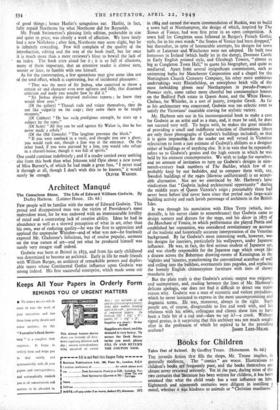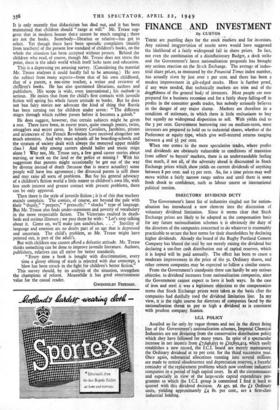Books for Children
Tales Out of School. By Geoffrey Trease. (Heinemann. 8s. 6d.)
TILE juvenile fiction thqt fills the shops, Mr. Trease implies, is generally mediocre, The " comics " are worse. Illustrations to children's books a.re frequently poor, and the books themselves are almost never reviewed seriously. Yet hi the past, duiing most of the two centuries that literature has been written for children, it has been assumed that what the child reads has a vast influence on him. Eighteenth and nineteenth centuries were diligent in instilling a moral, whether it was kindness to animals or "Christian manliness."
It is only recently that didacticism has died out, and it has been maintained that children should "range at will." Mr. Trease sug- gests that in modern houses these cannot be much ranging ; there are not the books. Somebody—librarian or relative—has got to select. Yet though there have been sporadic complaints (mainly from teachers) of the present low standard of children's books, on the whole the situation has been accepted without protest. Behind the children who read, of course, though Mr. Trease does not stress the point, there is the adult world which itself lacks taste and education.
This is a depressing yet amusing survey. (Considering the material Mr. Trease analyses it could hardly fail to be amusing.) He sees the subject from many aspects—from that of his own childhood, that of a parent, a one-time teacher, a writer and reviewer of chirdren's books. He has also questioned librarians, authors and publishers. His scope is wide, even international ; his outlook 'is serious. He insists that from the child's first contacts with juvenile fiction will spring his whole future attitude to books. But he does not ban fairy stories nor advocate the kind of thing that Russia has been turning out for children under seven : " The different stages through which rubber passes before it becomes a galosh."
He does suggest, however, thai certain subjects might be given a rest. There have been, in recent years, quite enough ponies, twins, smugglers and secret caves. In history Cavaliers, Jacobites, pirates and aristocrats of the French Revolution have received altogether too much attention. And why must schools all be boarding-schools and the stratum of society dealt with always the moneyed upper middle class ? And why among careers should ballet and music reign alone ? Why not, Mr. Trease says, a few good career stories about nursing, or work on the land or the police or mining ? With his suggestion that parents might occasionally be got out of the way by divorce instead of death (because that is nearer actuality) some people will have less agreement ; the divorced parent is still there and may raise all sorts of problems. But for his general advocacy of a children's fiction world a little nearer to children's own life, with less snob interest and greater contact with present problems, there can be only approval.
Then there is the style of juvenile fiction ; it is of this that teachers mainly complain. The comics, of course, are beyond the pale with their " thusly," " peepers," " prezaedy," " shocka " type of language. But Mr. Trease also finds under-statement and poverty of vocabulary in the more respectable fiction. The Victorians exulted in death- beds and serious illnesses ; we pass them by with: " Let's stop talking about it. Come on, we'll make jam sandwiches. . . ." Sterility of language and emotion are no doubt part of an age that is depressed and uncertain. The child's problem, as Mr. Trease might have pointed out, is part of the adult's. But with children one cannot afford a defeatist attitude. Mr. Trease thinks something can be done to improve juvenile literature. Authors, publishers, relatives can all strive for better standards. "Every time a book is bought with discrimination, every time a glossy oblong of trash is rejected with due contempt, a blow has been struck in the fight for children's better fiction." This survey should, by its analysis of the situation, strengthen the champions of reform. Meanwhile it has good entertainment value for the casual reader.
GWENDOLEN FREEMAN.



































 Previous page
Previous page